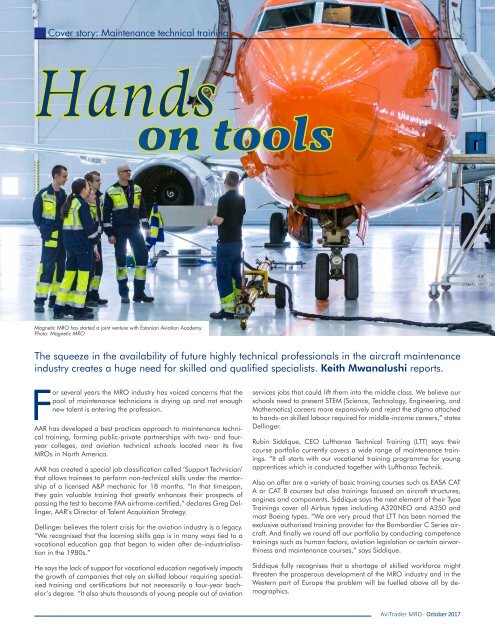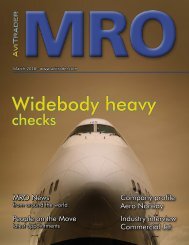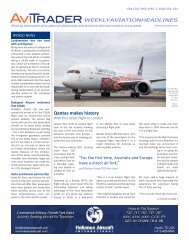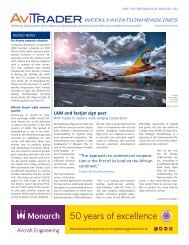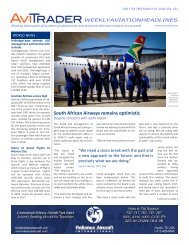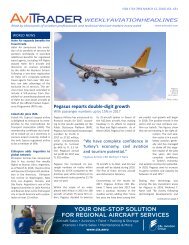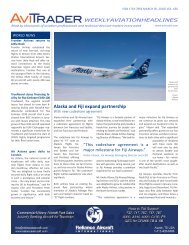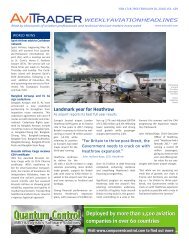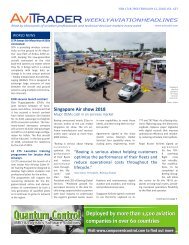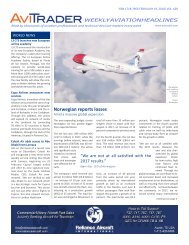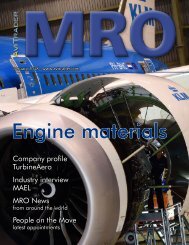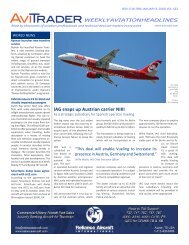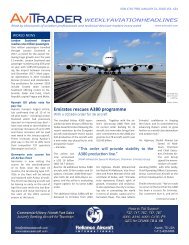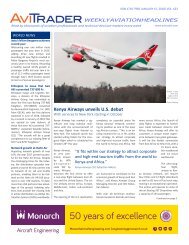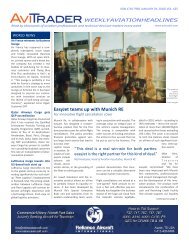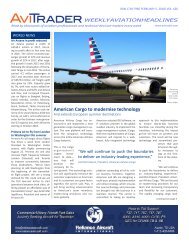AviTrader_Monthly_MRO_e-Magazine_2017-10
AviTrader_Monthly_MRO_e-Magazine_2017-10
AviTrader_Monthly_MRO_e-Magazine_2017-10
You also want an ePaper? Increase the reach of your titles
YUMPU automatically turns print PDFs into web optimized ePapers that Google loves.
Cover story: Maintenance technical training<br />
21<br />
Hands<br />
on tools<br />
Magnetic <strong>MRO</strong> has started a joint venture with Estonian Aviation Academy.<br />
Photo: Magnetic <strong>MRO</strong><br />
The squeeze in the availability of future highly technical professionals in the aircraft maintenance<br />
industry creates a huge need for skilled and qualified specialists. Keith Mwanalushi reports.<br />
F<br />
or several years the <strong>MRO</strong> industry has voiced concerns that the<br />
pool of maintenance technicians is drying up and not enough<br />
new talent is entering the profession.<br />
AAR has developed a best practices approach to maintenance technical<br />
training, forming public-private partnerships with two- and fouryear<br />
colleges, and aviation technical schools located near its five<br />
<strong>MRO</strong>s in North America.<br />
AAR has created a special job classification called ‘Support Technician’<br />
that allows trainees to perform non-technical skills under the mentorship<br />
of a licensed A&P mechanic for 18 months. “In that timespan,<br />
they gain valuable training that greatly enhances their prospects of<br />
passing the test to become FAA airframe-certified,” declares Greg Dellinger,<br />
AAR’s Director of Talent Acquisition Strategy.<br />
Dellinger believes the talent crisis for the aviation industry is a legacy.<br />
“We recognised that the looming skills gap is in many ways tied to a<br />
vocational education gap that began to widen after de-industrialisation<br />
in the 1980s.”<br />
He says the lack of support for vocational education negatively impacts<br />
the growth of companies that rely on skilled labour requiring specialised<br />
training and certifications but not necessarily a four-year bachelor’s<br />
degree. “It also shuts thousands of young people out of aviation<br />
services jobs that could lift them into the middle class. We believe our<br />
schools need to present STEM [Science, Technology, Engineering, and<br />
Mathematics] careers more expansively and reject the stigma attached<br />
to hands-on skilled labour required for middle-income careers,” states<br />
Dellinger.<br />
Rubin Siddique, CEO Lufthansa Technical Training (LTT) says their<br />
course portfolio currently covers a wide range of maintenance trainings.<br />
“It all starts with our vocational training programme for young<br />
apprentices which is conducted together with Lufthansa Technik.<br />
Also on offer are a variety of basic training courses such as EASA CAT<br />
A or CAT B courses but also trainings focused on aircraft structures,<br />
engines and components. Siddique says the next element of their Type<br />
Trainings cover all Airbus types including A320NEO and A350 and<br />
most Boeing types. “We are very proud that LTT has been named the<br />
exclusive authorised training provider for the Bombardier C Series aircraft.<br />
And finally we round off our portfolio by conducting competence<br />
trainings such as human factors, aviation legislation or certain airworthiness<br />
and maintenance courses,” says Siddique.<br />
Siddique fully recognises that a shortage of skilled workforce might<br />
threaten the prosperous development of the <strong>MRO</strong> industry and in the<br />
Western part of Europe the problem will be fuelled above all by demographics.<br />
<strong>AviTrader</strong> <strong>MRO</strong> - October <strong>2017</strong>


